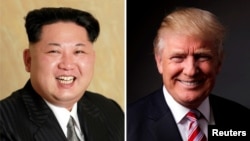President Donald Trump is ready to meet North Korean leader Kim Jong Un by May in response to Kim’s invitation to hold the first U.S.-North Korea summit, a South Korean envoy said, marking a potentially dramatic breakthrough in the North Korea nuclear standoff.
Here are the reactions from some politicians, officials and analysts:
Robert Gallucci, chief U.S. negotiator during the 1994 North Korean nuclear crisis:
“This is a surprising and welcome development. If representatives of both governments can meet, and a summit ultimately is held, it would represent substantial progress in reducing tension and the risk of war.
“If real negotiations result in verifiable arrangements aimed at the elimination of nuclear weapons programs in North Korea and an end to the further development of long-range ballistic missiles, the principal source of tension and hostility between the DPRK and the U.S. and the rest of the world will also be eliminated.”
Takashi Kawakami, president of the Institute of World Studies, Takushoku. University in Tokyo:
“I think the U.S. will wait to see how the North-South talks in April turn out before making a final decision on whether to meet, and I see three possible scenarios. The first is that North Korea will agree to denuclearization, second that North Korea will agree to a nuclear freeze with the U.S., and third that it withdraws its approach and returns to missile launches. Of those I see the second as the most likely, with Japan calling for continued pressure sidelined.
“There is nothing that Japan can do except show support for the U.S., which continues to call for maximum pressure on North Korea. And if the second scenario occurs, then Japan will have to seek a strengthening of the U.S. nuclear deterrent including nuclear sharing.”
Senator Lindsey Graham, Republican, on Twitter:
“After numerous discussions with President Trump, I firmly believe his strong stand against North Korea and its nuclear aggression gives us the best hope in decades to resolve this threat peacefully.
“I am not naive. I understand that if the past is an indication of the future, North Korea will be all talk and no action. However, I do believe that North Korea now believes President Trump will use military force if he has to.
“A word of warning to North Korean President Kim Jong Un ‘the worst possible thing you can do is meet with President Trump in person and try to play him. If you do that, it will be the end of you’ and your regime.”
Bonnie Glaser, Center for Strategic and International Studies:
“Trump is a deal maker and probably believes he can single-handedly convince Kim Jong Un to give up his nuclear weapons. A Trump meeting with Kim presents both risks and opportunities. The U.S. side needs to be very, very well prepared and know exactly what it wants to achieve, as well as what the U.S. is willing to provide in return.”
Ed Royce, Republican chairman of the House Foreign Affairs Committee:
“Kim Jong Un’s desire to talk shows sanctions the administration has implemented are starting to work. We can pursue more diplomacy, as we keep applying pressure ounce-by-ounce. Remember, North Korean regimes have repeatedly used talks and empty promises to extract concessions and buy time. North Korea uses this to advance its nuclear and missile programs. We’ve got to break this cycle. The United States and South Korea must stand shoulder-to-shoulder in applying the sustained pressure needed to peacefully end this threat. And Beijing must do its part.”
Daniel Russel, former U.S. assistant secretary of State for East Asia and the Pacific:
“Let’s hear from the North Koreans themselves what they are proposing and what they are willing to do. There is plenty of reason to be cautious, given their track record. Second, let’s read the fine print. The North has made peace overtures in the past that did not hold up under scrutiny.
“Also remember that the DPRK has for many years proposed that the President of the United States personally engage with North Korea’s leaders as an equal — one nuclear power to another. What is new isn’t the proposal, it’s the response.”
Mark Dubowitz, CEO of Washington’s Foundation for Defense of Democracies Think Tank:
“The administration’s maximum pressure campaign and rhetoric may be yielding results. We should be very cautious: North Korea has said these things before — Kim Jong Il wanted to meet with President Clinton. Pyongyang has to be serious about denuclearization. In the meantime the Trump administration should continue using the toughest sanctions to maintain maximum pressure before the summit in May.”














